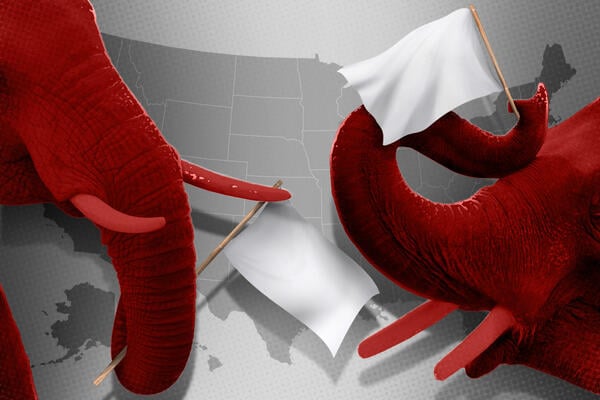
New Lawsuit Tactic From State and Federal GOP Raises Concern
Thanks to a slew of federal lawsuits filed by Republicans against Republicans, two states have now ended their policies that allowed undocumented students to receive in-state tuition and a grant program for Hispanic-serving institutions appears to be in jeopardy.
The lawsuits, all introduced over the last three months, have left advocates alarmed and scrambling to intervene in the litigation. They also outline a new maneuver in the playbook for GOP attorneys general and the Trump administration—suing each other to force policy changes that otherwise would require Congress or state legislatures to act.
Typically, lawsuits are designed to resolve a disagreement between two parties. But when the Justice Department sued Texas and Oklahoma and argued that their state policies were unlawful, the state attorneys general quickly agreed to scrap the law. District judges signed off as well, quashing undocumented students’ ability to attend college at a lower cost.
A similar situation played out in reverse when Tennessee sued the Department of Education, arguing that the enrollment criteria to be recognized as a Hispanic-serving institution were unconstitutional. The Trump administration is not planning to defend the program that was created by Congress in 1992. A judge has yet to weigh in, but hundreds of minority-serving institutions could lose access to millions in federal funding if the lawsuit succeeds in changing eligibility standards for the grant program.
Higher education and legal experts say this tactic is rather novel. But it’s one they expect the Trump administration will use more as a way to bypass lengthy legislative and rule-making processes and advance key agenda items.
“It’s consistent with the playbook that was outlined” by conservative think tanks, said Lynn Pasquerella, president of the American Association of Colleges and Universities. “They have said that we need to select and target initiatives like DEI across higher education, file lawsuits in favorable courts, pair with the government … and push for quick resolutions through injunctions, settlements and payouts that can then be leveraged.”
What makes this lawsuit tactic different from the other strategies Trump has used to crack down on higher education institutions, experts say, is that it’s not based solely on executive orders, investigations or funding freezes. Rather, it uses judicial review to enact presidential priorities. For instance, Trump targeted in-state tuition policies for undocumented students in an executive order and then used the lawsuits to enforce that provision.
Critics argue this approach is yet another example of overreach. Some have gone as far as to call it collusion.
Stephen Vladeck, a constitutional law professor at Georgetown University, said in a blog post earlier this summer that the Texas settlement set “a new (low) standard for shameless hypocrisy.”
“The Supreme Court has long made clear that Article III courts lack the power to adjudicate such transparently collusive lawsuits—because there is no true case or controversy when ‘both litigants desire precisely the same result,’” he wrote. “It’s all a stain on the federal courts—one that, in this case, comes at the literal expense of as many as 20,000 Texans who have been living in the United States since they were children.”
If given the chance, an appeals court shouldn’t let the decision stand, Vladeck added, but “I’m not holding my breath.”
Is It Collusion?
Both the federal government and states often use the courts to challenge laws that they don’t agree with.
During the Biden administration, Republican attorneys generals sued to block student debt relief plans as well as changes to the Title IX regulations that clarified protections for LGBTQ+ students. And the Biden administration filed its own lawsuits against Republican-led states to challenge immigration policy changes as well as laws banning gender-affirming care for minors.
But multiple legal experts told Inside Higher Ed they cannot remember a time when a lawsuit was filed with the same political party on both sides.
“I’ve never seen a time where the state or federal attorney general would intentionally refuse to defend a congressionally authorized program that’s been in place for years,” said Jodie Ferise, a former college professor, administrator and now partner at Church Church Hittle + Antrim, a law firm based in Indiana. “However, I have no confidence at all that we are operating under a playbook that operates the same way that it has in the past.”
She added that so far the lawsuits filed using this tactic seem to be cracking down on diversity, equity and inclusion efforts and scrubbing any last “vestige of what Republicans are calling discriminatory behavior.”
The Texas case, which was filed in June and was the first example of Trump suing an ally, played out just a month after the Texas Legislature tried and failed to repeal the provision of in-state tuition to certain undocumented students.
Since Texas officials agreed to scrap the policy, civil rights groups, immigrants’ advocates and an Austin-based community college have sought to intervene in the lawsuit, which would give them a chance to directly contest the state’s decision. But a district court denied their request last month, saying the intervenor’s arguments were “legally futile” and that they failed to state a “plausible claim.”
The judge added that the state attorney general’s office had sufficiently represented the interests of its constituents even if it did not present all of the same legal arguments as the intervenors.
But Miriam Feldblum, co-founder and CEO of the Presidents’ Alliance on Higher Education and Immigration, believes that the judge’s argument was “not true.”
“We know that what the attorney general and state of Texas did does not represent the interests of higher education,” she said. “This seems to be a tactic to evade actually substantive discussion, conversation and the ability to challenge an action in court.”
The challengers have since appealed the decision, but Feldblum said much of the damage has already been done, as thousands of undocumented students in Texas and Oklahoma face much higher tuition bills this academic year.
“Students who are near graduation do not feel like they have the resources to graduate because of the change in tuition rates,” Feldblum said.
Rescinding in-state tuition policies, the criteria for federal grant programs or any kind of DEI program “belies what the administration says it’s trying to do, which is promote economic investment and growth,” she added. “It’s undercutting higher education’s role in training, nurturing, graduating the future skilled workforce … it just doesn’t make sense.”
Still, most sources told Inside Higher Ed that they expect the president and red-state officials to use this tactic more often moving forward.
And even if an appellate court overturns the district courts’ decisions, legal experts say the highest court could side with the Trump administration. (An Inside Higher Ed analysis of lawsuits involving Trump shows that even if a district or appellate court rules in favor of a college or university, so far the Supreme Court has ruled in favor of the president every time.)
“We have seen the Supreme Court make some surprising rulings, often at odds with stare decisis and past precedent,” said Pasquerella from AAC&U. “We’ve seen the settlements people are agreeing to … and what it does is it creates a precedent for further coercive bullying tactics.”
All this makes it more difficult for colleges to navigate a policy landscape that’s increasingly filled with uncertainties.
Pasquerella said any prior assumption of partnership with the government in educating citizens and promoting civic engagement is out the window, forcing college presidents to increase and elevate their lobbying efforts. Ferise from Church Church Hittle + Antrim said she’s wadding up all of her notes on higher education policy and throwing them away; university administrators are doing the same.
“They don’t even know where to focus. They don’t know which ball to swing at first or if at all,” she explained. “Trump’s attack on higher ed is so unbelievably wide-ranging.”
In the meantime, Ferise is just advising college leaders to fix what they can and otherwise keep their heads down.
“We’re starting a new school year, but every single one of these schools is just trying to figure out how to not end up in the cross hairs,” she said.
Feldblum, on the other hand, said it is critical for institutions to keep engaging in litigation and pushing back.
“Whether that’s by joining an amicus brief or providing information that could be helpful to litigators, all of that is really important, because it’s incumbent upon higher education institutions to do so,” she said. “Even as institutions say, ‘How can we prepare in the future?’ one has to also make sure that we’re engaging in the present.”
Source link



